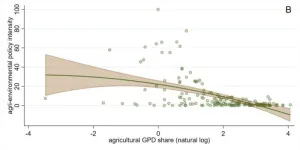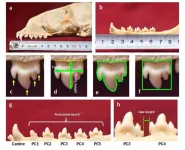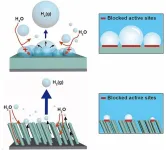(Press-News.org) Decommissioned offshore structures offer limited long-term ecological benefits if they are simply left in the ocean to serve as artificial reefs, a new study suggests.
The research, published in the journal Nature Sustainability, saw researchers carrying out a comprehensive analysis of existing studies into the environmental impacts of marine artificial structures – including oil and gas platforms and offshore wind farms – all over the world.
It highlighted that such installations can offer some ecological benefits – including increasing the diversity and abundance of fish species – in areas where the seafloor is mostly comprised of sand.
However, there was limited conclusive evidence that oil and gas platforms and offshore wind farms could provide further substantial benefits if they are left in the sea after being decommissioned.
In particular, the available evidence did not allow the researchers to draw clear conclusions on how the structures compare to natural rocky reefs – a key element in being able to determine whether they can function as artificial reefs.
As a result, they say more detailed investigations are needed into the best way to manage such structures at end-of-life, as repurposing them into artificial reefs may not provide the intended benefits.
The study was carried out by researchers at the University of Plymouth, Plymouth Marine Laboratory and the Centre for Environment, Fisheries and Aquaculture Science (Cefas).
They analysed data from more than 530 scientific studies on the effects of marine artificial structures in the sea. These ranged from oil and gas platforms and offshore wind farms established during the 20th and 21st century to accidental shipwrecks – some of which had lain on the seabed for over 400 years – and purpose-built artificial reefs.
It is particularly timely with global governments and other agencies setting targets of achieving net-zero emissions by 2050 as part of their decarbonisation agendas, resulting in the decommissioning of existing offshore platforms and the construction of thousands of new ones.
Dr Anaëlle Lemasson, Post-Doctoral Research Fellow at the University of Plymouth and the study’s lead author, said: “Many of the structures we see in the ocean today were put in place at a time when environmental considerations weren’t in people’s minds. There were also no legal requirements covering possible environmental impacts, or what might happen to these structures once they reached the end of their useful lives. That is certainly changing, and transitions away from fossil fuels mean it is vital we have this debate now. It is also critical that we learn lessons from the past, particularly at a time when increases in ORE installations are likely to result in more artificial structures being sited out at sea.”
The research was carried out as part of the Decommissioning – Relative Effects of Alternative Management Strategies (DREAMS) project, a consortium of industry and academics looking at the ecological effects of manmade structures in the North Sea.
It uncovered a considerable amount of research looking at the impact of the structures in situ, however there was very little research demonstrating the direct effects of decommissioning.
The study’s senior author, Dr Antony Knights, served as Co-Principal Investigator on the DREAMS project at the University of Plymouth. Now based at University College Cork, he added: “This study highlights just some of the challenges facing those working on the decommissioning of offshore structures. With limited existing evidence, it is almost impossible to give a definitive answer as to how best to deal with these platforms and other structures when they reach the end of their lives. For the time being, the best solution might be to deal with decommissioning on a case-by-case basis, but it is clearly something that needs addressing so it can be built into future development plans.”
ENDS
About the University of Plymouth
The University of Plymouth is renowned worldwide for its high-quality research, teaching and innovation. With a mission to Advance Knowledge and Transform Lives, the University drives the global debate in disciplines from marine and maritime to medicine, law, computing and climate action.
With a city centre campus and further state-of-the-art facilities spread across Plymouth and beyond, plus Devon and Cornwall’s stunning coast and countryside on the doorstep, the University provides a unique blend of urban and outdoor lifestyle opportunities for everyone who studies and works here. A three-time winner of the Queen’s Anniversary Prize for Higher and Further Education – most recently in respect of its pioneering research on microplastics pollution in the ocean – Plymouth consistently ranks among the world’s leading universities for its innovation, research and teaching in relation to the United Nations’ Sustainable Development Goals.
Plymouth’s teaching and learning excellence is reflected in one of the highest numbers of National Teaching Fellows of any UK university. With over 18,000 undergraduate and postgraduate students, plus a further 7,000 studying at partner institutions in the UK and around the world, and over 175,000 alumni pursuing their chosen careers internationally, the University of Plymouth has a growing global presence.
http://www.plymouth.ac.uk
END
Decommissioned offshore structures could offer only limited ecological benefits
2024-03-22
ELSE PRESS RELEASES FROM THIS DATE:
All countries’ agri-environmental policies at a glance
2024-03-22
There can be no analysis without data. In this spirit, researchers from the University of Bonn and the Swiss Federal Institution of Technology (ETH) Zurich have published a database containing over 6,000 agri-environmental policies, thus enabling their peers as well as policymakers and businesses to seek answers to all manner of different questions. The researchers have used two examples to demonstrate how this can be done: how a country’s economic development is linked to its adoption of agri-environmental policies and how such policies impact soil erosion. Their study has now been published in “Nature Food.” Embargo: Don´t publish before March 22, ...
Bees need food up to a month earlier than provided by recommended pollinator plants
2024-03-22
Embargoed until 08:00 AM GMT / 04:00 AM ET Friday 22 March 2024
Bees need food up to a month earlier than provided by recommended pollinator plants
Plant species which are recommended as ‘pollinator friendly’ in Europe begin flowering up to a month too late for bees, resulting in low colony survival and low production of queens.
This is the first time that research has quantified the decline in colony survival and queen production due to a shortage of early season food.
Enhancing ...
Discovery of a hidden quantum critical point in two-dimensional superconductors
2024-03-22
Weak fluctuations in superconductivity1, a precursor phenomenon to superconductivity, have been successfully detected by a research group of Tokyo Institute of Technology (Tokyo Tech). This breakthrough was achieved by measuring the thermoelectric effect2 in superconductors over a wide range of magnetic fields and over a wide range of temperatures from much higher than the superconducting transition temperature to very low temperatures near absolute zero. This revealed the full picture of fluctuations in superconductivity ...
Multi-cusped postcanine teeth are associated with zooplankton feeding in phocid seals.
2024-03-22
The morphology of an animal's teeth often reflects its diet. A well-known example of a mammal that feeds in the water is the crabeater seal (Lobodon carcinophaga), which consumes large amounts of zooplankton. Crabeater seals have complex, jagged teeth, which are believed to function as a sieve to retain krill in their mouths and filter it from seawater. Furthermore, recent studies have shown that the Baikal seal (Pusa sibirica) also preys on large quantities of zooplankton and possesses distinctive jagged teeth. Thus, while behavioral observations and tooth morphology studies suggest a ...
Outcomes after stem cell transplant in elderly patients with acute myeloid leukemia have improved since 2000
2024-03-22
Bottom Line: Among patients over 65 who received an allogeneic hematopoietic stem cell transplant (allo-HCT) for the treatment of acute myeloid leukemia (AML) between 2000 and 2021, leukemia-free and overall survival improved significantly over time.
Journal in Which the Study was Published: Clinical Cancer Research, a journal of the American Association for Cancer Research (AACR)
Author: Ali Bazarbachi, MD, PhD, senior author of the study and a professor at the American University of Beirut in Lebanon
Background: AML ...
Longer genes are linked to aging
2024-03-22
· Long genes have more potential sites for DNA damage
· Genes involved in brain loss during aging and linked to Alzheimer’s are very long
· New view of biological aging differs from previous beliefs
CHICAGO --- What causes our body to age? Four complementary studies, including one from Northwestern Medicine, have come to the same conclusion: long genes.
In a new paper, the scientists write about their findings and how they advance existing knowledge about aging.
“Long genes ...
Revolutionizing hydrogen production: Economical and efficient solutions unveiled
2024-03-22
Water eletrolysis process is a system that produces hydrogen by electrolyzing water. It is an eco-friendly technology that can produce hydrogen fuel, a future energy source, without emitting environmental pollutants, but its limitations have been pointed out as low hydrogen production efficiency and high production costs. Recently, a team of researchers from Pohang University of Science and Technology (POSTECH) published research that solved both problems at once, attracting attention.
A collaborative research team comprising Professor Jong Kyu Kim, Jaerim Kim, a Ph. D. candidate, Professor ...
James Webb Space Telescope captures the end of planet formation
2024-03-22
Scientists believe that planetary systems like our solar system contain more rocky objects than gas-rich ones. Around our sun, these include the inner planets – Mercury, Venus, Earth and Mars – the asteroid belt and the Kuiper belt objects such as Pluto.
Jupiter, Saturn, Uranus and Neptune, on the other hand, contain mostly gas. But scientists also have known for a long time that planet-forming disks start out with 100 times more mass in gas than solids, which leads to a pressing question: When ...
If faces look like demons, you could have this extraordinary condition
2024-03-22
Imagine if every time you saw a face, it appeared distorted. Well, for those who have a very rare condition known as prosopometamorphopsia (PMO), which causes facial features to appear distorted, that is reality.
As the Dartmouth-based website about prosopometamorphopsia explains, "'Prosopo' comes from the Greek word for face 'prosopon' while 'metamorphopsia' refers to perceptual distortions.''' Specific symptoms vary from case to case and can affect the shape, size, color, and position ...
Birmingham scientists win funding to develop “lollipops” for mouth cancer diagnosis
2024-03-22
VIDEO available to download HERE of scientist Ruchi Gupta explaining how she hopes to make a lollipop or lozenge to diagnose mouth cancer. The film features mouth cancer survivor Rachel Parsons and contains explicit images.
A ‘LOLLIPOP’ that can diagnose mouth cancer early could become a reality, thanks to a pioneering project funded by Cancer Research UK and the Engineering and Physical Sciences Research Council (EPSRC).
Dr Ruchi Gupta at the University of Birmingham has been awarded £350,000 over the next three years by Cancer Research UK and EPSRC to make a prototype flavoured ‘lollipop’ from a material called a smart hydrogel.
Smart ...





